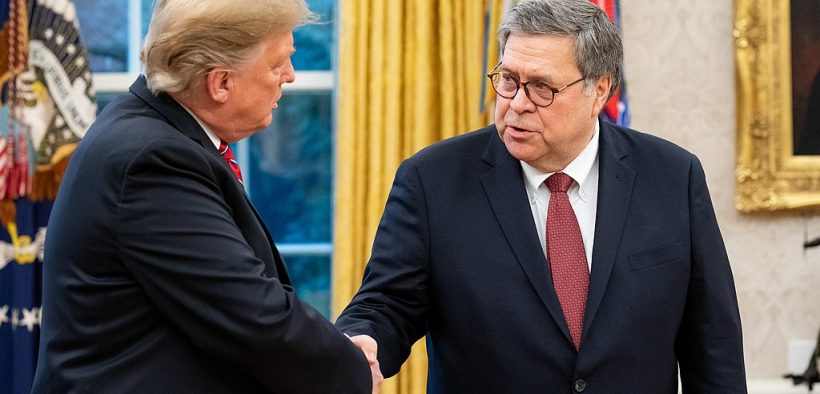Attorney General Barr Wants to End ‘Warrant Proof’ Encryption

“Banning encryption in America will not stop bad guys from using encryption… it will leave Americans less secure against intrusions by an administration that has shown [it is] willing to support lawless measures.”
In his speech in New York City on Tuesday, U.S. Attorney General William Barr emphasized the need for “backdoors” in encryption technology, arguing that the unmonitored use of “warrant proof” encryption tools can negatively affect public safety.
Barr’s comments bring concern from privacy activists who worry about the overreaching power of the government to spy on Americans. Warrant proof encryption has long been a point of contention between law enforcement and tech companies.
Cyberspace Is Becoming a ‘Law-Free’ Zone
Encryption software has made it more difficult for law enforcement to apprehend criminals, according to Barr. “Converting the internet and communication platforms into ‘law-free’ zones, and thus giving criminals the means to operate free of lawful scrutiny, will inevitably propel an expansion of criminal activity,” Barr said. “If you remove any possibility that the cops are going to be watching a neighborhood, the criminals already in the neighborhood will commit a lot more crimes.”
During two terrorist attacks in 2015, a shooting in Garland, Texas, and another in San Bernardino, California, encryption prevented investigators from accessing the terrorists’ online communication. Since then, law enforcement officers have pressed for a way to infiltrate criminals’ devices if they have “gone dark.”
Ability to Protect the Public from Criminal Threats Quickly Declining, Barr Says
“As this debate has dragged on and deployment of warrant-proof encryption has accelerated, our ability to protect the public from criminal threats is rapidly deteriorating,” Barr said in his speech. “The status quo is exceptionally dangerous, unacceptable and only getting worse. It is time for the United States to stop debating whether to address it and start talking about how to address it.”
Barr reiterated that cyber threats are not the only danger that the U.S. faces. “As the Federal government, we welcome these improvements to privacy and security, and will work to preserve and strengthen them. But at the same time, we must recognize that our citizens face an array of threats to their safety far broader than just cyber threats. Hackers are a danger, but so are violent criminals, terrorists, drug traffickers, human traffickers, fraudsters and sexual predators.”
Opposition to Barr’s Remarks
After the attorney general’s speech, Sen. Ron Wyden, D-Ore., condemned Barr’s remarks in his speech on the Senate floor. Wyden called Barr’s comments “deeply flawed,” going on to say that the Trump administration would use the “encryption backdoors” for political advancement.
“Banning encryption in America will not stop bad guys from using encryption, it will not ban basic math and algorithms elsewhere in the world,” Wyden said on the Senate floor. “It will only leave Americans less secure against foreign hackers, and … it will leave Americans less secure against intrusions by an administration that has shown [it is] willing to support lawless measures.”
According to Barr, today’s warrant-proof encryption has resulted in making our society more vulnerable in the real world.
“While we should not hesitate to deploy encryption to protect ourselves from cyber-criminals, this should not be done in a way that eviscerates society’s ability to defend itself against other types of criminal threats,” Barr said. “In other words, making our virtual world more secure should not come at the expense of making us more vulnerable in the real world. But, unfortunately, this is what we are seeing today.”
Can Law Enforcement and Tech Companies Collaborate?
Tommy Ross, senior policy director at the industry trade group BSA | The Software Alliance, said in a statement to Nextgov that law enforcement’s objective should be collaborating with tech companies to enhance their ability to bypass encryption technology rather than impairing the “tools themselves.”
Some surmise that Barr has done nothing but repeat the theories of the FBI. “Attorney General Barr has done little more than repeat the time-worn arguments against communications security that have been coming from the FBI,” senior counsel and director at the Center for Democracy and Technology’s Freedom, Security & Technology Project Greg Nojeim said in a statement, as Nextgov reported. “Nowhere does he acknowledge the exploitation of unencrypted metadata to solve crimes or the success of third-party contractors in exploiting even the most sophisticated encryption available in consumer devices.”















